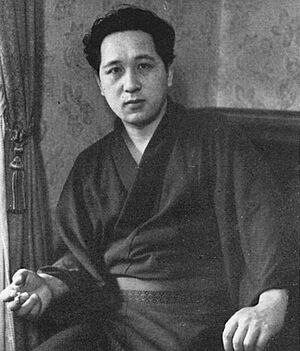Fumio Niwa facts for kids
Quick facts for kids
Fumio Niwa
|
|
|---|---|

Fumio Niwa in 1951
|
|
| Born | 22 November 1904 Yokkaichi |
| Died | 20 April 2005 (aged 100) |
| Nationality | Japanese |
| Alma mater | Waseda University |
| Genre | History |
Fumio Niwa (丹羽 文雄, Niwa Fumio, November 22, 1904 Japan, died April 20, 2005 in Musashino, Tokyo) was a famous Japanese novelist. He wrote many books during his long career. His most well-known novel in Western countries is The Buddha Tree, which was published in 1956.
When he was young, he became a Shin Buddhist priest. However, he decided to leave the priesthood after two years to become a writer.
Contents
Fumio Niwa's Life and Writing Journey
Early Life and Becoming a Writer
Fumio Niwa was born in Mie Prefecture, Japan, in 1904. He was the oldest son of a priest from a type of Buddhism called the Pure Land sect. He grew up at a temple named Sōgen-ji in Yokkaichi, near Nagoya.
After finishing his studies at Waseda University, he felt he had to follow in his father's footsteps. He became a priest at the temple. But he soon realized this was not what he wanted to do. At 29 years old, in 1932, he left the temple to pursue his dream of becoming a writer.
Starting His Writing Career
When he first started writing, Fumio Niwa was supported by his girlfriend. They later got married in 1935. During this time, he began to publish his works. One of his early stories was Sweetfish, which appeared in a magazine called Bungeishunjū. He also wrote a novel called Superfluous Flesh.
Writing During Wartime
Some of Niwa's early books caused a stir. During World War II, two of his novels were even banned because people thought they were not proper.
In 1938, Niwa joined a group called the Pen Butai. This was a government group of writers who traveled to war zones. Their job was to write positive stories about Japan's efforts in the Second Sino-Japanese War. Niwa worked as a war reporter in places like China and New Guinea. He even sailed with a naval fleet and was on a ship during a big sea battle in 1942. He was also injured in a place called Tulagi. These experiences inspired his books Naval Engagement and Lost Company. However, these books were also censored, meaning parts were removed by the government.
Success After the War
After World War II, Fumio Niwa became an incredibly busy writer. He wrote more than 80 novels, 100 collections of short stories, and 10 books of essays.
One of his most famous short stories was The Hateful Age, published in 1947. This story was about a family dealing with a difficult elderly grandmother. It became so popular that its title became a common saying in Japan for a while.
The Buddha Tree and Other Works
His novel The Buddha Tree tells a story that uses his own childhood experiences. When he was eight years old, his mother left the family. This event affected him deeply. In The Buddha Tree, he explored these feelings and memories in a fictional way.
Later in his life, he wrote a five-volume biography of Shinran. Shinran was a very important figure who founded the Pure Land sect of Buddhism. Niwa also wrote an eight-volume work about Rennyo, another important Buddhist monk from the 1400s.
Awards and Recognition
Fumio Niwa received many honors for his writing. In 1965, he became a member of the Japan Art Academy. The next year, he was chosen to be the Chairman of the Japanese Writers' Association. He held this important position for many years. He cared about other writers, encouraging them to play golf and even helping them get health insurance. He also bought land for a cemetery where writers could be buried.
He won the 19th Yomiuri Prize, a major literary award. In 1977, he was given the Order of Culture, which is one of Japan's highest honors for people who have made great contributions to culture.
Later Years
In 1986, Fumio Niwa was diagnosed with Alzheimer's disease. He was married twice and had a son and a daughter. His daughter, Keiko Honda, wrote a book called Days of Care in 1997. This book described her father's health decline. Fumio Niwa passed away in 2005 from pneumonia.
 | Charles R. Drew |
 | Benjamin Banneker |
 | Jane C. Wright |
 | Roger Arliner Young |

